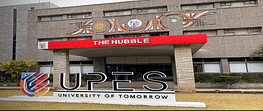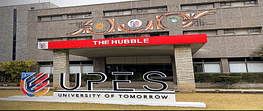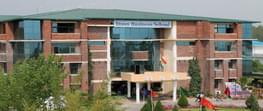Mr. Ankit is the Head of the Department at the Culinary College of Hotel Management and Catering Technology. Having completed a B.Sc. in Hotel Management and Hotel Administration from the Institute of Hotel Management Lucknow, Mr. Ankit has been working in the industry for over a decade. He has been associated with Mahindra Resorts Mussorie, JP Residency Manor, Dubai World Facility Management, Abu Dhabi National Hotel Facility Management Housekeeping, Ram Taal Resort and CCFIM.

What is the latest program that you are offering in your institute/dept. which will help students outperform and stand apart from the crowd?
Our latest programs offer training in cleaning techniques, safety protocols, and overall management skills. Specialized certifications, such as Green Cleaning or Occupational Health and Safety, showcase our commitment to sustainability and a safe working environment. Our courses try to enhance customer service skills, focus on staying updated on technology trends, and explore leadership training for a well-rounded skill set. Additionally, crisis management and emergency response training are taught to prepare students for unexpected situations. We advocate for reputable institutions, industry-recognized certifications, and practical experience to further distinguish yourself in the competitive hospitality industry.
What are the factors that make this program the best for the students to opt?
We boast a team of qualified instructors and offer strong networking and job placement support. We are also recognised by industry associations, are flexible in structure, and integrate cutting-edge technologies. The program also instills a global perspective for those seeking international opportunities. We have positive alumni outcomes and good reviews that further attest to the program's effectiveness. Ultimately, the best choice is one that aligns with individual career goals, provides a well-rounded education and prepares them for success in a dynamic and competitive job market.
What are the best practices in the course you’re offering?
The best practices in our educational course include defining clear learning objectives, employing engaging multimedia content, and structuring a logical curriculum. We employ diverse assessments and timely feedback and have interactive discussions that foster a collaborative learning community. We ensure accessibility and integrate technology effectively to enhance the overall learning experience. Relating theoretical concepts to real-world applications, maintaining instructor availability, and encouraging continuous improvement through student and instructor feedback contribute to a successful course. We also adapt ourselves to newer and better learning styles and regularly incorporate advancements in educational technology to further characterise effective educational practices.
What are some valuable insights of the program that you are offering at your institute/dept.?
Valuable insights into our course include a cutting-edge curriculum that addresses current industry trends, hands-on projects for practical experience, and expert instructors with industry knowledge. We offer numerous networking opportunities, career development support, and a flexible, student-centric approach that contributes to a holistic learning environment. We have a global perspective and an emphasis on innovation and research to stimulate critical thinking. We focus on continuous improvement, guided by student and industry feedback, which ensures the program's relevance. These elements collectively foster a dynamic and comprehensive educational experience, preparing students not only for immediate success but also for ongoing adaptability in their chosen field.
How does the program ensure that students are being prepared for the future?
The program ensures future preparedness by maintaining a dynamic curriculum aligned with industry trends, fostering practical skills through real-world projects, and integrating cutting-edge technologies. A global perspective, an emphasis on soft skills, and a commitment to continuous learning cultivate adaptability. Industry partnerships provide insights into evolving needs, while career development support aids successful transitions. Research opportunities stimulate innovation, and a feedback-driven approach facilitates ongoing improvements. By combining these strategies, the program not only equips students with current knowledge but instils the mindset and abilities crucial for navigating and excelling in the future job landscape.
Check Culinary College of Hotel Management and Catering Technology Faculty
How did you train yourself/faculty to deliver this program to the students?
Faculty training includes staying updated on industry trends, utilising educational technologies, and refining pedagogical techniques. Ongoing feedback mechanisms are there, both from students and evaluations, to guide continuous improvement. Simulation exercises and role-playing enhance real-world teaching skills. Encouraging faculty to engage in continual learning through conferences and community-building activities fosters a dynamic and supportive teaching environment. The integration of student feedback ensures that teaching methods remain responsive to evolving educational needs, collectively ensuring faculty readiness to deliver a high-quality and future-oriented program.
How do you tend to build an industry connect with this program?
We forge industry connections by establishing advisory boards with experts, inviting professionals for guest lectures, and facilitating internships or placement programs. The college also organises networking events, conferences, and alumni engagements to foster student-industry interaction. We integrate industry projects and collaborative research initiatives, addressing real-world challenges and offer professional development opportunities and company visits for firsthand experience. We try to maintain a robust online presence for industry engagement and seek partnerships and sponsorships. Moreover, we establish feedback loops to ensure the program aligns with industry standards, enhancing student employability and providing a dynamic, industry-relevant learning environment.
What were the challenges that you faced while inculcating this program in your curriculum?
Introducing a new program faces challenges such as faculty resistance, resource constraints, and scheduling issues. Crafting a relevant curriculum aligned with industry needs while meeting accreditation standards requires careful planning. Student buy-in, effective stakeholder communication, and addressing technical hurdles in technology integration are crucial. Balancing time constraints, ensuring effective assessment methods, and cultivating industry collaborations add complexity. Overcoming these challenges demands strategic planning, faculty development, and a commitment to communication and adaptability.
What are the types of projects that the students are working on through this program?
Business students might conduct market research or create marketing plans. Environmental science projects could involve proposing sustainable solutions or participating in conservation efforts. Healthcare students may conduct clinical research or implement healthcare management strategies. Art and design projects include creating original portfolios or designing visual identities. Data science students analyze real-world datasets, while social science students conduct sociological studies or participate in community projects. Architecture projects involve designing real-world structures, and culinary arts students engage in culinary events or food sustainability initiatives
What are the benefits and career options after pursuing this course?
Completing the course offers specialised knowledge, practical skills, and networking opportunities. Graduates benefit from improved career prospects, personal growth, and industry relevance, with a global perspective. Career options include securing entry-level positions, advancing into specialised or managerial roles, entrepreneurship, consulting, research and development, and teaching. The program equips individuals to contribute to innovation and analysis within their field, fostering a diverse range of professional opportunities and pathways. Specific benefits and career trajectories depend on the program's focus, industry demand, and individual aspirations. Continuous learning and networking enhance long-term career prospects and adaptability.

![Culinary College of Hotel Management and Catering Technology - [CCHMCT]](https://image-static.collegedunia.com/public/college_data/images/logos/1628769729Screenshot20210812173148.png?h=71.7&w=71.7&mode=stretch)


.png?h=132&w=263&mode=stretch)







.png?h=78&w=78&mode=stretch)




![ICFAI Business School - [IBS]](https://image-static.collegedunia.com/public/college_data/images/appImage/1690451211dehradun.jpg?h=111.44&w=263&mode=stretch)





![Graphic Era Hill University - [GEHU]](https://image-static.collegedunia.com/public/college_data/images/appImage/57205_cover 1.jpg?h=111.44&w=263&mode=stretch)





![MBA/PGDM | admission | 2024 | Narsee Monjee Institute of Management Studies - [NMIMS Deemed to be University]](https://image-static.collegedunia.com/public/college_data/images/logos/1506323004Logo.jpg?h=72&w=72&mode=stretch)




![MBA/PGDM | admission | 2024 | Indian Institute of Management - [IIMC]](https://image-static.collegedunia.com/public/college_data/images/logos/1488950580d2.png?h=72&w=72&mode=stretch)









.png?h=72&w=72&mode=stretch)





![Landmark Foundation Institute of Management and Technology - [LMF]](https://image-static.collegedunia.com/public/college_data/images/logos/1629203856Screenshot20210817180716.png?h=72&w=72&mode=stretch)
![Navinchandra Mehta Institute of Technology and Development - [NMITD]](https://image-static.collegedunia.com/public/college_data/images/logos/1709620089LogoNMITD.jpg?h=72&w=72&mode=stretch)


![Arni School of Hotel Management and Tourism Management - [ASHMTM]](https://image-static.collegedunia.com/public/college_data/images/logos/1752815514ARNInew.png?h=72&w=72&mode=stretch)

![Ausskill International Hotel School - [AIHS]](https://image-static.collegedunia.com/public/college_data/images/logos/16811949131524362535944.jpg?h=72&w=72&mode=stretch)
![Kukreja Institute of Hotel Management & Catering Technology - [KIHMCT]](https://image-static.collegedunia.com/public/college_data/images/logos/col8020.jpg?h=72&w=72&mode=stretch)

![Dewan V.S. Institute of Hotel Management & Technology - [DVSIHMT]](https://image-static.collegedunia.com/public/college_data/images/logos/1564829750Screenshotfrom20190803150412.png?h=72&w=72&mode=stretch)

![Institute of Business Management & Research - [IBMR]](https://image-static.collegedunia.com/public/college_data/images/logos/1510751520images.jpg?h=72&w=72&mode=stretch)
![Imperial Institute of Management and Technology - [IIMT]](https://image-static.collegedunia.com/public/college_data/images/logos/1707109080logoq121.jpg?h=72&w=72&mode=stretch)

![Servo Hospitality School - [SHS]](https://image-static.collegedunia.com/public/college_data/images/logos/1615272557Untitled.png?h=72&w=72&mode=stretch)




Comments